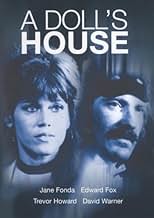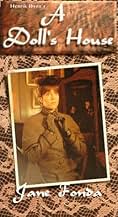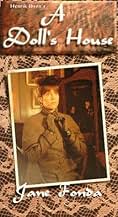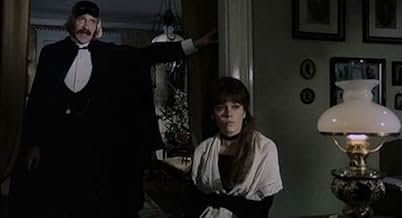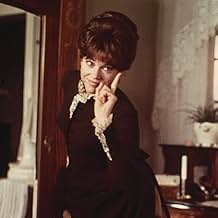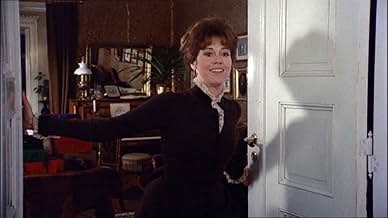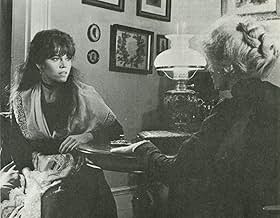NOTE IMDb
6,0/10
859
MA NOTE
Des années auparavant, Nora a commit un méfait pour sauver son mari autoritaire. Elle vit dans la peur que son époux sache un jour la vérité. Faisant l'objet d'un chantage elle vit dans la c... Tout lireDes années auparavant, Nora a commit un méfait pour sauver son mari autoritaire. Elle vit dans la peur que son époux sache un jour la vérité. Faisant l'objet d'un chantage elle vit dans la crainte que son mari ne l'apprenne..Des années auparavant, Nora a commit un méfait pour sauver son mari autoritaire. Elle vit dans la peur que son époux sache un jour la vérité. Faisant l'objet d'un chantage elle vit dans la crainte que son mari ne l'apprenne..
- Réalisation
- Scénario
- Casting principal
Pierre Oudrey
- Olssen
- (as Pierre Oudry)
Morten Floor
- Bob
- (non crédité)
Tone Floor
- Emmy
- (non crédité)
Dagfinn Hertzberg
- Krogstad's Son
- (non crédité)
Ellen Holm
- Krogstad's Daughter
- (non crédité)
Freda Krogh
- Helmer's Maid
- (non crédité)
Frode Lien
- Ivar
- (non crédité)
Ingrid Natrud
- Dr. Rank's Maid
- (non crédité)
Robert Rietty
- Small part actor
- (voix)
- (non crédité)
Avis à la une
I have been using this film to supplement my teaching of the play to literature classes for a dozen or more years, and it has always been my contention that Jane Fonda was born to play Nora Helmer. She is, as another reviewer has observed, most convincing in the final scene, when Ibsen metaphorically slams the door on conventional marriage--in 19th century Europe, at least. But Fonda's take on Nora is always fascinating, whether she is sneaking macaroons, flirting with Dr. Rank, or dancing the tarantella. Clare Bloom as Nora, in the other film version of the play, is also worth a look, but less is demanded of her than of Fonda, who must convey Nora's progress from schoolgirl to child bride to fully enfranchised adult. One reservation, however: while I don't mind Losey's tampering with the sequencing of the play--such is the license accorded to filmmakers--I do feel that the dialogue in the early scenes, absent from Ibsen's text except as exposition, is awkwardly scripted. Otherwise, this is a winner all around.
I saw both the Claire Bloom and Jane Fonda versions, and there is simply no comparison.
Bloom - No monotone in her voice, voice is NOT flat and emotionless, you can understand what she is saying because she doesn't speak at a hundred miles an hour, and her performance is believable. She changes her voice's intonation so it doesn't sound like a robot recording.
Fonda - Exact opposite I was stunned to find out that Fonda actually got good reviews for her performance. Let's take the final scene for example. When she tells Torvald to check his mail, she says very flatly, "YoushouldcheckyourmailTorvald." Had I not known what she was saying from having discussed this play in class and seen the Claire Bloom version, there is no way I would have known what she said. This pattern continues. I was ready to shoot myself having to watch such an emotionless failure that Fonda presents.
And as for Hollywood changing the scenes around, can't they simply leave a story alone? They didn't write A Doll House (NOT A Doll's House, this implies possession, and Nora - the doll - possesses NOTHING) so why can't they just leave the script alone? Watch the Claire Bloom version. She and Anthony Hopkins played their roles very well. My only complaint about that version is the mistake in the title
Bloom - No monotone in her voice, voice is NOT flat and emotionless, you can understand what she is saying because she doesn't speak at a hundred miles an hour, and her performance is believable. She changes her voice's intonation so it doesn't sound like a robot recording.
Fonda - Exact opposite I was stunned to find out that Fonda actually got good reviews for her performance. Let's take the final scene for example. When she tells Torvald to check his mail, she says very flatly, "YoushouldcheckyourmailTorvald." Had I not known what she was saying from having discussed this play in class and seen the Claire Bloom version, there is no way I would have known what she said. This pattern continues. I was ready to shoot myself having to watch such an emotionless failure that Fonda presents.
And as for Hollywood changing the scenes around, can't they simply leave a story alone? They didn't write A Doll House (NOT A Doll's House, this implies possession, and Nora - the doll - possesses NOTHING) so why can't they just leave the script alone? Watch the Claire Bloom version. She and Anthony Hopkins played their roles very well. My only complaint about that version is the mistake in the title
This film version of Henrik Ibsen's classic dramatizes events only spoken about in the play, which makes the opening very slow. They do get down to the business of plot, but you don't get an immediate sense for the story and characters. Additionally, there are location scenes which distract from the characterizations. So, you could say "A Doll's House" with Jane Fonda (as Nora) spends too little time in the house. Director Joseph Losey sometimes has cinematographer Gerry Fisher's camera glide (but not dance) like Ms. Fonda.
Another version, with Claire Bloom in the "Nora" role, was released earlier in the year. Filmmakers were correct in assuming moviegoers might not be interested in seeing this material twice. Although Fonda was a relatively good box office draw (and excellent actress) her version misses the target, and was sent directly to US television. Delphine Seyrig, herein playing "Kristine Linde", would probably have better played the elusive Nora; if Greta Garbo hadn't retired, her hoped-for version would have proved unassailable.
***** A Doll's House (8/24/73) Joseph Losey ~ Jane Fonda, David Warner, Edward Fox, Delphine Seyrig
Another version, with Claire Bloom in the "Nora" role, was released earlier in the year. Filmmakers were correct in assuming moviegoers might not be interested in seeing this material twice. Although Fonda was a relatively good box office draw (and excellent actress) her version misses the target, and was sent directly to US television. Delphine Seyrig, herein playing "Kristine Linde", would probably have better played the elusive Nora; if Greta Garbo hadn't retired, her hoped-for version would have proved unassailable.
***** A Doll's House (8/24/73) Joseph Losey ~ Jane Fonda, David Warner, Edward Fox, Delphine Seyrig
When I first watched this movie, it was with my mom, and she brought up a good point. While not condoning Torvald's attitude (personally, I couldn't stand him), she said that he couldn't treat Nora like a woman when she acted so much like a child. While it's true, he seemed to prefer it that way, the fact remains that if she had behaved like a mature woman, a wife and mother of two young children, he would have been forced to acknowledge that and most likely wouldn't have referred to her in front of company as "my little songbird", and the like.
Too often Nora comes off as silly, like when she's showing off the clothes she's going to wear on her trip with Torvald to her friend, Kristine, it comes off more as a kid sister showing off her dress for the dance, than two friends of around the same age having a talk. Later, when the family physician, Dr. Rank, whom Nora regarded as an uncle (again showing her little girl persona), reveals his love for her (as a woman, not a niece), she can't handle it and wants to pretend it doesn't exist. She wants nothing to upset her applecart.
The apples are forced to tumble when she's confronted by how Torvald really feels about her actions, which were done out of love, but he refuses to give her a break, to even try to understand. Suddenly, the little girl has to grow up.
I would have liked the story better if the children had been Torvald's from a first marriage, so Nora wouldn't actually be leaving her own children, and this to me weakened the story. Unless it's meant to show that Nora was so childlike that she didn't have actual maternal feelings for her children, they were just sources of amusement, like toys.
My real interest in this movie was the relationship between Nils and Kristene. Nils starts out as the villain and ends up as the lovelorn hero. Kristene was seen to have made a heartbreaking sacrifice for her family and was not the gold-digger Nils thought her to be.
A good movie, based on Ibsen's good play, and both give you things to think about.
Too often Nora comes off as silly, like when she's showing off the clothes she's going to wear on her trip with Torvald to her friend, Kristine, it comes off more as a kid sister showing off her dress for the dance, than two friends of around the same age having a talk. Later, when the family physician, Dr. Rank, whom Nora regarded as an uncle (again showing her little girl persona), reveals his love for her (as a woman, not a niece), she can't handle it and wants to pretend it doesn't exist. She wants nothing to upset her applecart.
The apples are forced to tumble when she's confronted by how Torvald really feels about her actions, which were done out of love, but he refuses to give her a break, to even try to understand. Suddenly, the little girl has to grow up.
I would have liked the story better if the children had been Torvald's from a first marriage, so Nora wouldn't actually be leaving her own children, and this to me weakened the story. Unless it's meant to show that Nora was so childlike that she didn't have actual maternal feelings for her children, they were just sources of amusement, like toys.
My real interest in this movie was the relationship between Nils and Kristene. Nils starts out as the villain and ends up as the lovelorn hero. Kristene was seen to have made a heartbreaking sacrifice for her family and was not the gold-digger Nils thought her to be.
A good movie, based on Ibsen's good play, and both give you things to think about.
"A Doll's House" is a film based on the play by Henrik Ibsen. The story focuses on the lives of Nora and Torvald Helmer and those around them and challenges the norms of marriage in the Victorian era.
This adaptation features a notable cast. Jane Fonda effectively captured the fluttery yet ultimately strong character of Nora. David Warner was appropriate to play the villain role as he often does. Trevor Howard is excellent as Dr. Rank and likewise Edward Fox and Delphine Seyrig were solid as Krogstad and Kristine.
As an adaptation of a great play, though, this film leaves something to be desired. Many unnecessary scenes were added that were not in the play, which led to problems. In added scenes, information is revealed at the start of the film which is not normally learned until later in the play. Ibsen wrote the play in such a way that the history of the characters is ambiguous and slowly revealed. Providing background information on the characters before the main events of the play dampened the element of surprise that adds a lot of interest to the play.
Another problem was that adding scenes or drawing out sequences lowered the tension compared to Ibsen's play, particularly toward the end. Also unfortunate was the fact that they unnecessarily added a handful of extra locations not seen in the play and modified a lot of the dialogue. The original structure and dialogue of the play is already perfect, so any changes only made this film worse. It would have been nice to see the cast of this film with a script that closely followed Ibsen's original work. Despite these flaws the main ideas of the story were intact and this is a watchable adaptation, but disappointing given its deviations from the original play.
This adaptation features a notable cast. Jane Fonda effectively captured the fluttery yet ultimately strong character of Nora. David Warner was appropriate to play the villain role as he often does. Trevor Howard is excellent as Dr. Rank and likewise Edward Fox and Delphine Seyrig were solid as Krogstad and Kristine.
As an adaptation of a great play, though, this film leaves something to be desired. Many unnecessary scenes were added that were not in the play, which led to problems. In added scenes, information is revealed at the start of the film which is not normally learned until later in the play. Ibsen wrote the play in such a way that the history of the characters is ambiguous and slowly revealed. Providing background information on the characters before the main events of the play dampened the element of surprise that adds a lot of interest to the play.
Another problem was that adding scenes or drawing out sequences lowered the tension compared to Ibsen's play, particularly toward the end. Also unfortunate was the fact that they unnecessarily added a handful of extra locations not seen in the play and modified a lot of the dialogue. The original structure and dialogue of the play is already perfect, so any changes only made this film worse. It would have been nice to see the cast of this film with a script that closely followed Ibsen's original work. Despite these flaws the main ideas of the story were intact and this is a watchable adaptation, but disappointing given its deviations from the original play.
Le saviez-vous
- AnecdotesBecause the Claire Bloom version of "A Doll's House" played in U.S. theatres that same year, the Jane Fonda version went directly to network television in the United States, after playing at the New York Film Festival.
- Crédits fousAll technical credits are listed alphabetically in the concluding credits-crawl, with no especial prominence given to director, writer, cameraman, etc. over any of the others.
- ConnexionsEdited into The Modern World: Ten Great Writers: Henrik Ibsen (1988)
Meilleurs choix
Connectez-vous pour évaluer et suivre la liste de favoris afin de recevoir des recommandations personnalisées
- How long is A Doll's House?Alimenté par Alexa
Détails
Box-office
- Budget
- 900 000 $US (estimé)
- Durée
- 1h 46min(106 min)
- Mixage
- Rapport de forme
- 1.66 : 1
Contribuer à cette page
Suggérer une modification ou ajouter du contenu manquant


